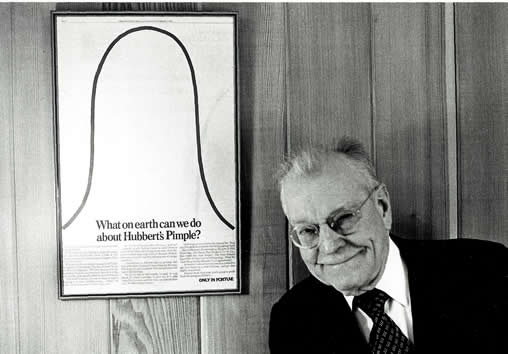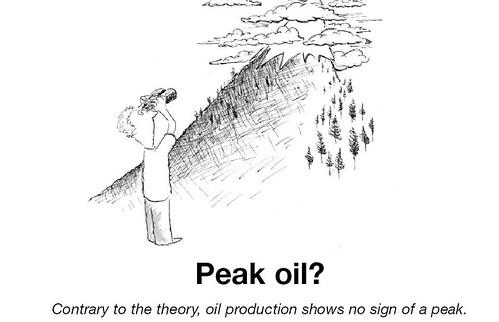Peak Energy
Friday, March 31, 2006
Wednesday, March 29, 2006
energy laundering
Interview with Chalmers Johnson: Cold Warrior in a Strange Land
TD: I assume you'd agree that our imperial budget is the defense budget. Do you want to make some sense of it for us?
Johnson: Part of empire is the way it's penetrated our society, the way we've become dependent on it. Empires in the past -- the Roman Empire, the British Empire, the Japanese Empire -- helped to enrich British citizens, Roman citizens, Japanese citizens. In our society, we don't want to admit how deeply the making and selling of weaponry has become our way of life; that we really have no more than four major weapons manufacturers -- Boeing, Lockheed Martin, Northrop Grumman, General Dynamics -- but these companies distribute their huge contracts to as many states, as many congressional districts, as possible.
The military budget is starting to bankrupt the country. It's got so much in it that's well beyond any rational military purpose. It equals just less than half of total global military spending. And yet here we are, stymied by two of the smallest, poorest countries on Earth. Iraq before we invaded had a GDP the size of the state of Louisiana and Afghanistan was certainly one of the poorest places on the planet. And yet these two places have stopped us.
Militarily, we've got an incoherent, not very intelligent budget. It becomes less incoherent only when you realize the ways it's being used to fund our industries or that one of the few things we still manufacture reasonably effectively is weapons. It's a huge export business, run not by the companies but by foreign military sales within the Pentagon.
This is not, of course, free enterprise. Four huge manufacturers with only one major customer. This is state socialism and it's keeping the economy running not in the way it's taught in any economics course in any American university. It's closer to what John Maynard Keynes advocated for getting out of the Great Depression -- counter-cyclical governmental expenditures to keep people employed.
The country suffers from a collective anxiety neurosis every time we talk about closing bases and it has nothing to do with politics.
Piercing, insightful interview by a premier geo-political analyst.
In energy terms, one can only boggle at the investments in fear and loathing that the United States makes every year. It is wasteful and mostly useless. Why not chop our military in half, cutting our imports of foreign fossil fuel every year by a quarter? (Rough estimate!) Get those damn welfare queens off the dole.
Is this the legacy desired or the legacy deserved?
so green, you can taste it
Carbon cloud over a green fuel via FTW
Late last year in Goldfield, Iowa, a refinery began pumping out a stream of ethanol, which supporters call the clean, renewable fuel of the future.
There's just one twist: The plant is burning 300 tons of coal a day to turn corn into ethanol - the first US plant of its kind to use coal instead of cleaner natural gas.
An hour south of Goldfield, another coal-fired ethanol plant is under construction in Nevada, Iowa. At least three other such refineries are being built in Montana, North Dakota, and Minnesota.
Everyone "knows" ethanol is green. GM is running desperation ads about their new whiskey slurping beaters, with fresh faced generation what? models talking earnestly about sunny days.
So practice your sneer.
"Bah -- they burn coal to make this stuff. It's disgusting."
Wednesday, March 22, 2006
Friday, March 17, 2006
Wednesday, March 15, 2006
vonnegut interlude
Well,” says Vonnegut, “I just want to say that George W. Bush is the syphilis president.”
The students seem to agree.
“The only difference between Bush and Hitler,” Vonnegut adds, “is that Hitler was elected.”
“You all know, of course, that the election was stolen. Right here.”
Off to a flying start, Vonnegut explains that this will be his “last speech for money.” He can’t remember the first one, but it was on a campus long, long ago, and this will be the end.
...
“We have people in this country who are richer than whole countries,” he says. “They run everything.
“We have no Democratic Party. It’s financed by the same millionaires and billionaires as the Republicans.
“So we have no representatives in Washington. Working people have no leverage whatsoever.
“I’m trying to write a novel about the end of the world. But the world is really ending! It’s becoming more and more uninhabitable because of our addiction to oil.
Tuesday, March 14, 2006
do no harm
Reader Bill drew my attention to this comment of mine a while back.
You said:
"The impediments human battle in maintaining civilization are mainly cultural
not technical...”
I found this an amazing statement to be found on a discussion of Peak Oil where most folks seem to be talking about physical survival and techno-fixes or the lack thereof. Can you expand on your statement? How I understand it is the centerpiece of my work (www.sacredearthnetwork.org) so your comments would be appreciated.
I strongly believe that we have a cultural problem, not a technical one.
Here at the peak of available energy, immersed in a culture of waste, an industrial civilization when presented with a large problem will try to solve it with a larger problem.
For example, the imagined nuclear paradise that will “bridge us” to our abundant energy future. Huh? Manufacture poison and store it at random around the continent so as every household in America can have five televisions stored at 72 degrees Fahrenheit? Can we just conserve and switch to wind power instead?
Consider agriculture. Without cheap oil at hand, North America will hopefully take her cue from Cuba. The good white collar jobs in 2015 will all be in high yield organic farming, not “information technology”. There won’t be enough energy available to engage in risky, bullshit ventures like switchgrass ethanol on a widespread scale. The most efficient use of plant energy will be to feed the people who tend the plants.
This would seem to be beneficial in the long run for a culture. Kind of a bright green future. Some people seem to think they can do the bio-sphere better than what exists, a splice here, a glowing frog there. Maybe. I’d like to start by preserving the working system that exists.
Industry must be scaled such that they become provably sustainable. I am not advocating for Amish style communities here. I don’t think the way any individual group lives and sustains is important, simply that the largest cities take care in sustaining, likewise the smallest communities.
As a starting guideline, engineering should focus on the least toxic alternatives for every task, and when toxins are generated by man (as they also are by nature) they should not be shunted through public sewers and into the oceans. This is exactly what happens presently. The result is that bio-additive heavy metals, drugs, and toxins are sold to farmers as “fertilizer” and end up in your tomatoes. Once applied to a layer of soil, heavy metals will stay put for thousands of years.
I could go on for quite a long time with examples, but I think the point of separation between the culture we have now, and what we must do to survive with grace and style are pretty clear.
Our boot is so heavy on this planet that the feel good myth of America, a little capitalist plot we can each call home, has failed. It is pointless to subdivide the world and engage in the stupid, stupid tragedy of the commons when we are elbow to elbow with our neighbors. When fishing boats jostle in the same waters for declining ocean fish. When forests are leveled so catalogues can print words like “teak” and “mahogany”. So you can eat beef every day. Delicious, tastes like water table.
Instead of dividing and shuffling wealth, the world has been rendered small enough that it should be apparent to all civilizations on this planet that there is a collective burden and the responsibility to fix the damage done. To repair what we’ve broken. It certainly is physically possible, unless perhaps we’ve broken the carbon cycle. (Hope not.) Not only is it physically possible, but it is a perfectly valid “industry” for humans to engage in.
The failure is one of imagination. The failure is in thinking that wealth stolen from other parts of the world is sustainable. No. The world is finite.
If you own a computer, you live in a bubble of stolen wealth with me.
Where do your responsibilities lie?
This is not a guilt trip.
Saturday, March 11, 2006
Grand Theft Cancer
A Cancer Drug's Big Price Rise Disturbs Doctors and Patients
On Feb. 3, Joyce Elkins filled a prescription for a two-week supply of nitrogen mustard, a decades-old cancer drug used to treat a rare form of lymphoma. The cost was $77.50.
On Feb. 17, Ms. Elkins, a 64-year-old retiree who lives in Georgetown, Tex., returned to her pharmacy for a refill. This time, following a huge increase in the wholesale price of the drug, the cost was $548.01.
...
Last August, Merck, which makes Mustargen, sold the rights to manufacture and market it and Cosmegen, another cancer drug, to Ovation Pharmaceuticals (...) Now Ovation has raised the wholesale price of Mustargen roughly tenfold and that of Cosmegen even more, according to several pharmacists and patients.
Given that these patients are likely to die, I think it is very noble of the drug companies to extract every last penny. As everybody knows, you can't take it with you.
So raise a glass to the petro-industrial-pharmaceutical cabal.
They have the best of intentions.
Wednesday, March 08, 2006
M. King Hubbert - Dapper Dan man?
Energy Bulletin alerts us to 50 years of Hubbert Geologic Smackdown; click on the pictures for more.


Tuesday, March 07, 2006
death cult
Drumbeat sounds familiar
Washington is compiling a dossier of grievances against Tehran similar in scope and seriousness to the pre-war charge-sheet against Iraq. Other complaints include Iranian meddling in Iraq, support for Hamas in Palestine and Hizbullah in Lebanon, and human rights abuses.
...
While hopes of avoiding confrontation are not yet dead, warnings by John Bolton, the US ambassador to the UN, that Iran could face "painful consequences" over its nuclear activities were a reminder of Mr Bush's repeated refusals to eschew armed force. Iranian officials believe the US is determined to undermine and if possible overthrow Iran's theocracy and President Mahmoud Ahmadinejad's government - regardless of whether a nuclear compromise is reached. That helps explain Tehran's hardline negotiating stance.
With the Bush administration, rhetoric is never to be taken lightly. That said, attacking Iran would be suicidal for the U.S., and the West. The lean energy years would be kickstarted chaotically.
Shocking, then, is that it is being considered, that mustachioed freaks like "ambassador" John Bolton haven't yet been used as target practice by chickenhawks, as would seem appropriate for such foolishness. A little bird shot for your hubris, my good man.
Can someone please shut up the bloodstained, cackling minions of this administration?
Monday, March 06, 2006
a free baked potato
Fire season coming early ... to SouthWest
The statistics in the Southwest read like a laundry list of bad news: Phoenix has been without rain for four months. Tucson is suffering through its driest winter on record, as is Albuquerque, N.M. Some Tucson homeowners have actually watered cactus plants to keep them alive.
While much of the West has above-average snowpack this year, Arizona and New Mexico have not been so lucky. Those states, along with parts of Alaska, Wyoming, Colorado, Nevada, Utah and California, are at above-normal risk for wildfires, according to the National Interagency Fire Center.
To mention that areas as disparate as Great Britain and Kenya are also suffering drought might seem a bit gloomy, if accurate. Of course, with climate change, other areas get more than their share of rain and heavy weather.
If these trends continue, it is worth pondering where ones food actually comes from.
Do optimists shuck our corn?
Thursday, March 02, 2006
the wild slide – short takes
Opec accuses Bush of threatening energy security
Moving away from oil made it more difficult for producing countries to invest the billions of dollars needed to ensure enough output to meet future demand, the Organisation of the Petroleum Exporting Countries, the group that control's 40 per cent of world oil supplies, argued in the commentary of its monthly Bulletin magazine.
The group's comments came in direct response to Mr Bush's repeated calls for the US to reduce by 75 per cent its "addiction" to oil from the Middle East by 2020.
Poor OPEC – On the wrong side of history, too feckless to even leave a toothmark on the pathetic likes El Presidente Bush. Better put your dentures in before you go ‘sploring for oil.
Study - Decline in (Autism) After Removal of (Mercury)
According to the study “[t]he results indicate that the trends in newly diagnosed NDs correspond directly with the expansion and subsequent contraction of the cumulative mercury dose to which children were exposed from [thimerosal-containing vaccines] through the U.S. immunization schedule.”
The authors point out that their finding that the VAERS and CDDS databases show strong associations between thimerosal containing vaccines and neurodevelopmental disorders completely contradicts the 2004 findings contained in a report published by the Institute of Medicine of the National Academy of Sciences – which was based on data controlled exclusively by the Center for Disease Control’s National Immunization Program and unavailable to outside researchers.
News flash! Flossing your brain with mercury is still bad! Scientists who work for certain government or industry concerns and claim otherwise based on data they don't release -- feh. These types shouldn't call themselves scientists, when they are simply mercenaries.
Bush's Mysterious 'New Programs'
"I stand by this president's ability, inherent to being commander in chief, to find out about Fifth Column movements, and I don't think you need a warrant to do that," Graham added, volunteering to work with the administration to draft guidelines for how best to neutralize this alleged threat.
…
Plus, there was that curious development in January when the Army Corps of Engineers awarded Halliburton subsidiary Kellogg Brown & Root a $385 million contract to construct detention centers somewhere in the United States, to deal with "an emergency influx of immigrants into the U.S., or to support the rapid development of new programs," KBR said.
You may be thinking, “I’m white, and I drive a Hummer, so why the fuck should I worry?” Well, first they come for the Geo Metros. Then they come for the Diesel Rabbits. Say nothing, and one day they may come for you.
(SciAm Blog) Facing the Facts on Oil
Just under Glenn Zorpette's nice op-ed article in today's New York Times (see entry below) was a large ad-ed placed by ExxonMobil. Titled "Peak Oil? Contrary to the theory, oil production shows no sign of a peak," the piece blows smoke at the growing consensus among serious petroleum geologists that production of the cheap oil on which all modern economies are based is fast approaching the day when it stops growing to match demand, levels off for a while, and then inexorably falls. While many of its peer companies, including BP and Shell, have recognized the coming sea change and have begun (slowly) restructuring their research and development accordingly, ExxonMobil has apparently decided to address this looming socioeconomic problem by trying to convince the public and politicians that it isn't there. The facts suggest otherwise. Scientific American was among the first to present the scientific basis for projections of a peak in global production of conventional crude, in our 1998 special section "Preventing the Next Oil Crunch," which led with an article on "The End of Cheap Oil."
Hilarious. Exxon took out an ad against “Peak Oil”. Good times. Good times. That pretty much becomes the cornerstone of my argument, don’t know about anybody else out there.
Finally, your moment of Blog Zen –
Reader Eric Rachner poses a question:
“The economic law that honest exchange demands only things of real value as currency cannot be repealed. The chaos that one day will ensue from our 35-year experiment with worldwide fiat money will require a return to money of real value. We will know that day is approaching when oil-producing countries demand gold, or its equivalent, for their oil rather than dollars or Euros. The sooner the better.”
Answer here.





